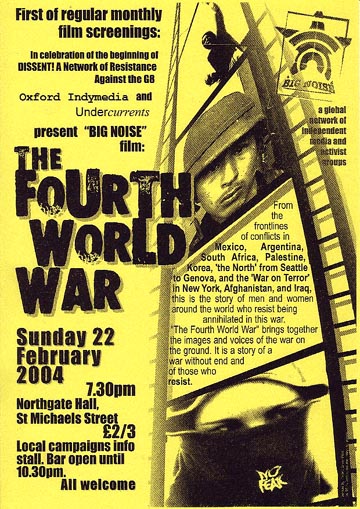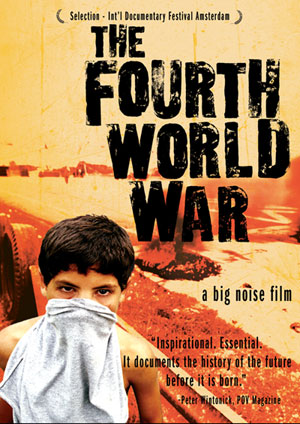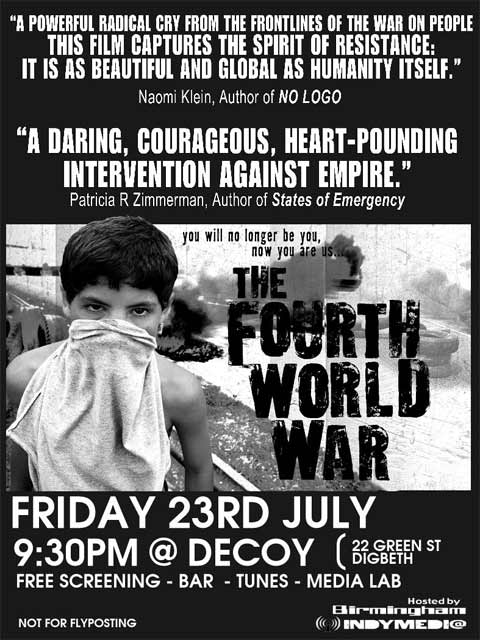The Fourth World War: Interview with Rick Rowley of Big Noise Films
fwd | 25.08.2004 13:41 | Globalisation | Indymedia | Zapatista | World
From the front-lines of conflicts in Mexico, Argentina, South Africa, Palestine, Korea, 'the North' from Seattle to Genova, and the 'War on Terror' in New York, Afghanistan, and Iraq, comes a feature-length documentary from Big Noise Films. The product of over two years of filming on the inside of movements on five continents, "The Fourth World War" is a film that would have been unimaginable at any other moment in history. Directed by the makers of "This Is What Democracy Looks Like" and "Zapatista" , produced through a global network of independent media and activist groups, it is a truly global film from and for our global movement.

Fourth World War

"Fourth World War" flyer

Fourth World War (Big Noise Films)
Indypendent: What is the Fourth World War?
Rick Rowley:
We first heard the term ‘Fourth World War’ from the Zapatistas in 1996. It’s a conflict that transcends the logic of states. It is a war without a singular enemy or fixed battlefields. There are not two sides in the Fourth World War. It is a system at work everywhere violently reorganizing our lives. In some places the system works with bullets and bombs, in others with hunger and neglect, in others it isolates us in terror and turns us into accomplices in this global violence. There is no longer any distinction between combatants and noncombatants, no “outside” to this war. Our only choice is to stand with the men and women around the world who resist being annihilated in its violence.
Indypendent: At the start of the globe-trotting in the movie, it says “this is not a tour and we are not tour guides.” What’s that?
Rick Rowley:
Tourism participates in and depends on this capitalist logic of distance and alienation. It simulates and sells connection to some authentic other while keeping it all safely outside of our selves and our borders. The Fourth World War makes itself vulnerable to the word of the other. It does not claim to penetrate an indigenous “heart of darkness,” to condense and contain the truth of 500 years of struggle, but looks for points of resonance and connection. It asks viewers to allow themselves to be wounded and changed by the things they see and hear. It invites them to read themselves into this story as participants rather than observers.
Indypendent: How did this film get made?
Rick Rowley:
It would have been unimaginable at any other moment in history. It was produced in and through a global network of movements that has never existed before – movements that share a common language of resistance and a deep feeling of interconnection. Even though two of us shot 90% of the images in the film, it was only made possible by a network of independent media activists that numbers in the tens of thousands.
Indypendent: Living inside the American bubble, the rest of the world feels unreal sometimes. Did you have an American audience in mind when you set out around the world?
Rick Rowley:
We are only allowed to see people in Palestine, Iraq and Afghanistan through the cross-hairs of a military machine. We see the war shot from the noses of bombs. We hear it narrated by generals.
We want the audience to stand, for an instant, with children facing down tanks in the Jenin refugee camp and to feel, even for an instant, that their life is connected to the lives of people all around the world.
Indypendent: Sometimes it feels like the government opresses everyone together, but we resist separately. Is there a feeling of global solidarity in the movements you documented?
Rick Rowley:
There have been other moments of global uprising – 1968 saw the Tet offensive in Vietnam and uprisings in Algeria, Prague, Paris, Chicago, Mexico City and beyond. But there is something special about this moment. There is a self-consciously articulated feeling of connection in the street that feels new.
If you talk to a piquetero in Argentina about their struggle, they will mention the Zapatistas. The anti-privatization movements in South Africa send organizers to Argentina to share their experiences and strategies of struggle. In South Korea the labor movement studies movements in Latin America and Africa to help shape their resistance to neoliberalism. The Zapatistas have deep ties to the global justice movement in Europe and North America. And the Palestinian intifada is a part of our imaginary of struggle everywhere.
Indypendent: While many of the movements you profiled are involved in resistance, its note-worthy that you didn’t include revolutionary movements, such as in Colombia and Nepal. Is there a reason you’ve side-stepped popular movements that are aiming to govern, not just resist?
Rick Rowley:
The difference between some of the movements in the film and groups like the FARC or Communist Party of Nepal (Maoist) is about their tactical relationship to the State.
If anything characterizes movements today, it is anachrony – the simultaneous presence of groups and tactics representing a dizzying diversity of moments and interests. This diversity is a strength, and movements working to seize state power are an important part of who we are.
The Zapatistas have protected and governed an autonomous territory in the South of Mexico for over a decade. They have built an indigenous education, healthcare and political system along with collective development projects like coffee and honey collectives. The movements in Argentina have seized land, printed new currencies, occupied factories and created new forms of collective power. But neither movement wants to take state power. The Zapatistas say that the priviledged form of struggle during the Cold War was revolutionary nationalism – from Vietnam to South Africa to Cuba and Nicaragua to the Black Panthers and Young Lords.
In contrast, the movements they are a part of today are globalist and autonomist. A painful lesson of many movements in the last few decades has been that state power is not enough to defend against global capital. Without the power to redraw economic and social geographies individual states can be isolated, bought off, undermined from the outside or invaded and destroyed.
The ANC was a real popular movement and a legitimate representative of the will of the people, but in its negotiated settlement with the apartheid state it won political power while leaving the economic system in tact. Its leaders probably did this with the best intentions, imagining that state power would allow them to gradually transform the economic and social geography of apartheid, but in effect they betrayed their people. They demobilized the movement in the streets and the workers in the mines, privatized water housing and electricity and deepened the economic divisions of apartheid.
The movements emerging in South Africa today are no longer interested in standing in elections - instead they are redeploying the tactics of the anti-apartheid struggle against privatization and “making privatization unworkable on the ground.” They resist evictions, reconnect water and electricity and have created a autonomous regions in the townships where police, water and electricity companies can not go.
Indypendent: How did September 11 transform the global anticapitalist movement?
Rick Rowley:
We’re still fighting over what the meaning of September 11 was. It ripped a hole in the narrative of what it means to be an American, what our place in the world. The media tried to fill it with war, patriotism and violence. There’s another possiblity. It could be a moment when we became a part of the global community, with a connection to the people around the world who’ve been living with extreme violence for a long time.
Radicals we met in South Africa say that apartheid was not defeated through elections or through a decisive military engagement. Apartheid was defeated by making it unworkable on the ground through thousands of collective acts of rebellion and dissobediance.
Elections and marches by themselves can’t stop this war. The lesson of the massive february 15 demos was that the system can ignore global public opinion. Protest must be part of a broader movement that can make this war unworkable on the ground as well.
Between the Zapatista uprising in 1994 and the Genoa, Italy protests of 2001, and Seattle for lots of us in movements to fit every struggle in the world to fit everything into one template. Since 2001, not just the attacks in New York – but also the uprisings in Genoa and Argentina, it became difficult to maintain that analysis. There’s a crisis in power. The globalizers and the financial elites represented by the IMF are in a real conflict with the old, colonial-style imperialists like the neo-cons.
How the world resistance deals with this is being figured out right now.
fwd